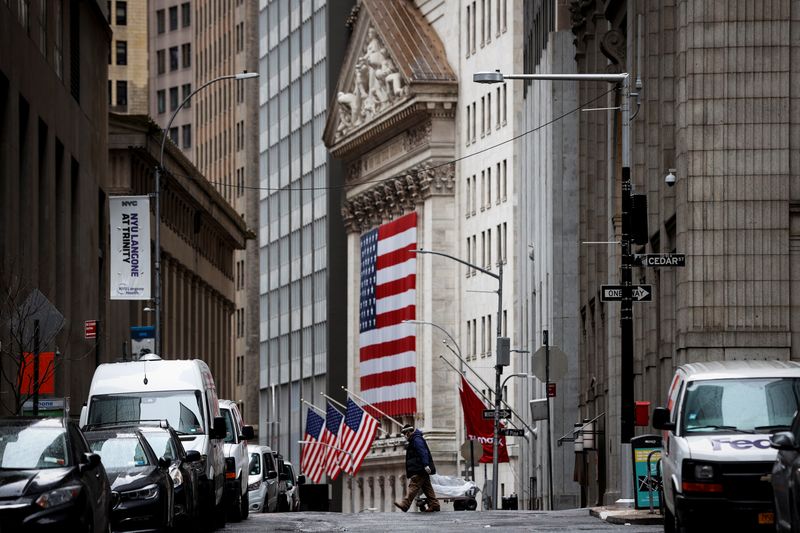This post was originally published on this site
https://i-invdn-com.akamaized.net/trkd-images/LYNXNPEG3N0W8_L.jpg
(Reuters) – The S&P 500 edged higher in choppy trading on Friday as some states prepared to relax curbs imposed to contain the coronavirus outbreak, but declines in Intel and Boeing weighed on the blue-chip Dow Jones.
Boeing Co (N:BA) fell 4.3% after a report said the planemaker was planning to cut 787 Dreamliner output by about half, while chipmaker Intel Corp (O:INTC) shed 3.1% as it forecast second-quarter profit below estimates and said it could not issue an outlook for the full year.
Six of the 11 S&P 500 sector indexes were trading higher, but the energy index (SPNY) lost 0.1% as oil prices headed for their third straight weekly loss after a historic collapse on Monday.
From Tennessee and Texas to Ohio and Montana, governors announced plans to swiftly allow a return to business for some workplaces on signs the pandemic was peaking in some of the worst hit parts of the country.
“We are past the peak and slowly, but surely, all the states that have not had major cases will gradually re-open, and the market is taking that as a signal that demand is going to come back,” said Thomas Hayes, managing member at Great Hill Capital LLC in New York.
Early sentiment was also supported by the latest $500 billion relief package that cleared the U.S. House of Representatives the previous day. The bill is with President Donald Trump, who is expected to sign it into law.
The benchmark S&P 500 (SPX) is still 17% below its record high despite gaining ground this month, and investors fear a deep economic slump following a crash in business activity.
Overall, analysts expect a 14.1% decline in S&P 500 first-quarter earnings, with profits for the energy sector estimated to slump nearly 60%, raising fears of debt defaults, layoffs and possible bankruptcies.
On Friday, however, data showed orders for non-defense capital goods excluding aircraft, a closely watched proxy for business spending plans, edged up 0.1% last month, compared with economists’ expectations of a 6% plunge.
“Maybe it does tell us that the potential for recovery is slightly better than what was anticipated,” said Seema Shah, chief strategist at Principal Global Investors in London.
The CBOE volatility index (VIX), known as Wall Street’s fear gauge, was down for the third straight session.
At 10:31 a.m. ET the Dow Jones Industrial Average (DJI) was down 5.91 points, or 0.03%, at 23,509.35, the S&P 500 (SPX) was up 3.89 points, or 0.14%, at 2,801.69 and the Nasdaq Composite (IXIC) was up 10.43 points, or 0.12%, at 8,505.18.
Verizon Communications Inc (N:VZ) inched lower as it lost 68,000 phone subscribers who pay a monthly bill in the first quarter.
American Express Co (N:AXP) fell 0.4% after posting a 76% drop in first-quarter profit as the credit card issuer braced for potential losses stemming from the coronavirus outbreak.
Declining issues almost matched advancers on the NYSE and the Nasdaq.
The S&P index recorded one new 52-week highs and no new low, while the Nasdaq recorded 18 new highs and six new lows.

